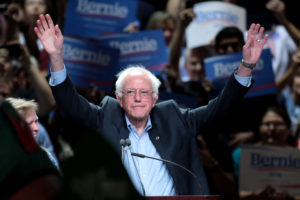At the same time Bernie Sanders supported Hillary Clinton in Philly, he also did her a favor here in Oregon. He prevented Donald Trump from winning the Independent Party’s primary in our state. On the day Sanders gave his key-note speech at the DNC, the Independent Party of Oregon posted the results of its legislative survey and presidential ballot (conducted earlier in July). Sanders beat Trump by a narrow margin while Clinton came in third, less than ten points ahead of Libertarian Gary Johnson.
This little contest forecasts big challenges for Clinton among Independents. Dissatisfaction with the status quo has been growing since the economic crash and subsequent government bailout, both brought to us by two-party leadership. This is why the longest serving Independent in Congress attracted overwhelming grassroots support during the Democratic primary. It’s why Trump handily defeated all the establishment picks in the Republican primary. Clinton has yet to build that kind of appeal.
Here are the results of the Independent Party’s ballot, which used a process known as “approval voting.” Each person could vote for as many candidates as they would support as president (hence the numbers add up to more than 100%).
Bernie Sanders —— 31.50%
Donald Trump ——– 30.08%
Hillary Clinton ——– 24.02%
Gary Johnson ——– 16.07%
John Kasich ———– 12.27%
Jill Stein —————– 9.49%
Ted Cruz —————- 5.68%
None-of-above —— 9.17%
What does this mean? Had Trump prevailed, it would have afforded him valuable bragging rights. The Independent Party of Oregon gained more new members between 2007 and 2015 than the Democrats and Republicans combined, making Oregon one of the first three-party states in America. The 1,549 citizens who participated in the IPO’s ballot are among the most motivated voters in this demographic. In terms of third-party dynamics, these results are worthy of attention both inside and outside our state.
So Clinton should be thankful. Sanders did what she could not and warded off support for Trump among a key constituency. She should add that to her gratitude for his efforts to steer his revolutionaries into her fold. Are these gifts sufficient to help her win? This begs another question: if the first order of business for Democrats is winning, why did leaders work against Sanders and neglect their task of running a fair primary?
It is noteworthy that Sanders victory in the IPO ballot may have been weakened because he had already endorsed Clinton over a week before voting ended. Had that not happened, Sanders might have beaten both Trump and Clinton by more votes. On the other hand, Clinton’s performance may have benefited from Sander’s endorsement. Not enough for her to beat Trump in the IPO primary, even with approval voting. Will his endorsement help push her over the top in November?
While Oregon is considered a safe bet for Democrats, Trump now views our state as competitive. This is a fair assessment. Trump came very close to winning the IPO ballot. Sanders won Oregon’s closed Democratic primary by a significant margin, and many Sanders voters do not trust Clinton. Can she overcome that distrust, attract enough Sanders voters to defeat a formidable opponent who almost beat them both? It doesn’t bode well for Clinton’s chances when she appoints Debbie Wasserman Shultz as honorary chair of her 50-State campaign to elect Democrats, right after Shultz was forced to resign as DNC chair because of proof she unfairly tilted the playing field against Sanders.
Prior to the convention, national polls pointed to Sanders as the best candidate to win the presidency for Democrats. Oregon’s Indie primary adds weight to that assertion. Sanders may not be the only person who can defeat Trump, yet it looks like the final outcome will be close, and it may be more than a two-person race. The winner is likely to be the one who’s perceived as a real change-agent, not a self-serving pretender. The IPO ballot shows that part of the big change people want is to break the collusion between big money and politicians. Legislative priorities chosen by voters include full disclosure from lobbyists, clear transparency in funding political ads (not just listing nice-sounding names of PACs), improved management and access to public records, and — my favorite — prohibiting public officials from voting on government decisions that give significant special benefits to their largest campaign contributors.
The DNC cannibalized the candidate who genuinely advocates for such change. In the end Sanders gave himself up willingly, trusting the spirit of a movement he started to transform the creature that consumed him. Independents like me are watching closely to see if that happens. Be assured we will press on, regardless.

Substitute Jill Stein for Bernie, and the results are similar for a nationwide model put together by someone I saw on Facebook. In this model, Stein wins the electoral college vote over Trump, with Clinton way behind. Very interesting.
Haven’t seen that projection. If there’s a link feel free to share it here. Sounds far-fetched at this point, but also compelling because I’m a fan of Stein. Also wonder if the modeler factored in votes for Gary Johnson, who beat Stein in the IPO ballot.
Judging from Hillary and Bill’s history (and her choice for VP) I’m guessing she’s going to focus more of her campaign on attracting more moderate Republicans like Kasich, But she’ll try to keep Bernie supporters on board as well. It will be interesting to see how she manages this balancing act. The person who may have the most to lose is Bernie, if he engages in high-profile stumping for her while she courts the centrist corporate base.
Still don’t know why Gary Johnson polls better than Jill Stein, especially among youth.